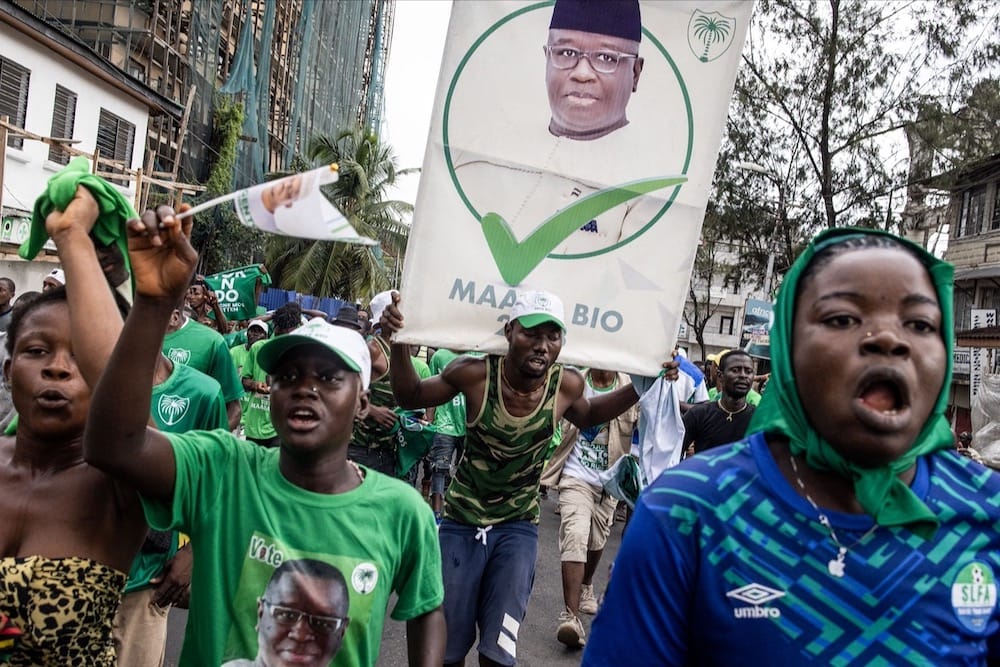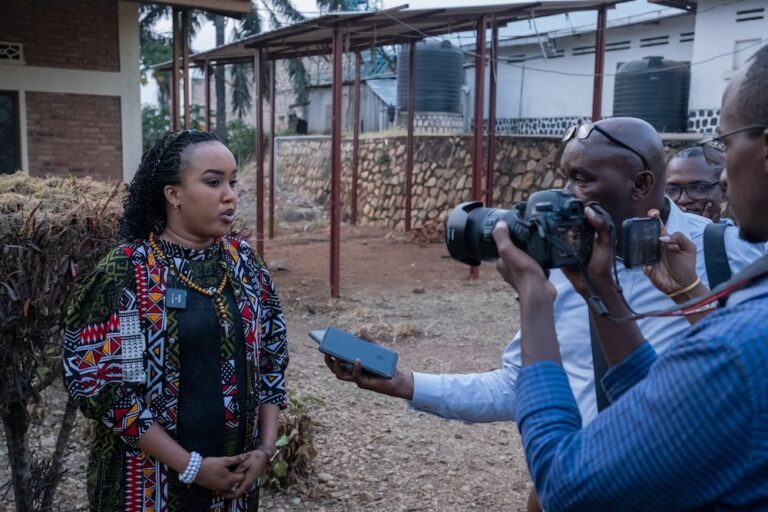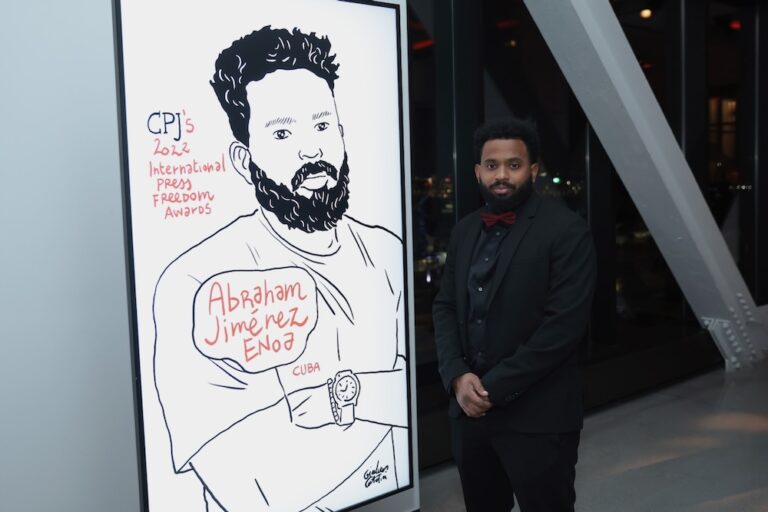Special International Day to End Impunity Issue: Reyhana Masters' latest Africa brief shines a light on the intersections between impunity, journalists' safety, and elections, based on IFEX member reports and news from the region.
Going by this year’s high stake elections in Nigeria, Zimbabwe and Sierra Leone, during which the media were caught in the fray of rising tensions prior to polling day, UNESCO’s theme for the 2023 International Day to End Impunity for Crimes Against Journalists (IDEI) is rather apt. The notion of giving “visibility to the role of a safe and free press in ensuring the integrity of elections and our democratic systems” becomes increasingly significant with eight elections scheduled for the remainder of the year.
As pointed out in an International Media Support report:
“Electoral periods in any country can be contentious, tense and with a higher probability for conflict than other times, particularly in transitional and post-conflict environments. It is in these environments, too, in which journalists and media workers are more prone to be the subjects of aggression, violence and abuses.”
Diffusing these politically charged tensions to enhance the safety of journalists is becoming an essential component of the advocacy work of freedom of expression and media freedom advocates on the African continent. The focus of the interventions is centred on three essential pillars – safety training for journalists, conflict-sensitive election reporting, and police-media dialogue.
A novel and innovative activity primed at minimising attacks on media practitioners and their outlets has been the facilitation of meetings and discussions between the police and media by the Media Foundation for West Africa (MFWA) and the Media Institute of Southern Africa (MISA) in their respective regions.
The bridge-building strategy may not have completely eliminated the harassment and arrests of journalists, but it is certainly contributing to a reduction in violations by the police and security sector – particularly because the dialogue sessions have been instrumental in providing “an opportunity for the two groups to have frank discussions on the challenges the police have with the media and vice versa.” These conversations are not always easy, but if premised on the understanding that “exchange is based on open communication, acknowledgement of conflict areas (real, perceived or potential) and a mutual understanding that the discussion may be difficult and touch on areas of tension,” there is an opportunity “to move beyond polarization and polarized arguments and work together towards mutually beneficial ends.”
Of course each country context is different, and an effective dialogue may bring about transformations other than those expected. As cited in the IMS report: “In Togo, for example, one significant challenge was the fractured media community. There were numerous (at least ten) media unions and associations and relations had been characterized by rivalry and tension; it was rare for these organisations to work together. Ensuring the successful organisation and implementation of a dialogue forum, however, prompted these organisations to work together and put aside their differences.”
The meetings convened in Zimbabwe were equally productive, as MISA notes that “following the proclamation of the 2023 Zimbabwean elections on 31 May 2023 and the holding of the elections on 23 August 2023 (a period usually characterised by a spike in media freedom violations), only three (3) violations involving political actors were recorded. No media violations involving the police or other security arms of the state were recorded during that period.”
During the dialogue sessions held throughout Zimbabwe between media provincial committees and officers in the local area, the police agreed to:
- Create a safe working environment for journalists through training of police officers on the role of journalists and the media;
- Expand their understanding of human rights norms, and
- Engage professional media bodies to raise concerns over media conduct or content;
while media practitioners agreed to:
- Familiarise themselves with policies, regulations and laws relating to electoral issues;
- Commit to accurate and balanced reporting and to correct inaccurate stories sincerely and without prejudice;
and both sectors agreed:
- To carry out training for both journalists and police officers on how to handle conflict situations;
- That political parties needed to be brought into these discussions, as they were also at the forefront of media freedom violations.
Lesotho’s code of conduct – a game changer
In 2022, some of the media fraternity took the lead in mitigating against the violence that is synonymous with Lesotho’s electoral landscape by crafting a pledge committed to upholding ethical principles of journalism during elections.
This simple yet effective advocacy tool “went a long way in securing an improved working environment for journalists in the country as they covered the 2022 elections,” reported MISA in a post-election review of the environment.
CIPESA and KICTANet unpack the who, how and impact of disinformation
With electoral integrity increasingly undermined by threats to the information environment and in particular through rampant disinformation, the Collaboration on International ICT Policy for East and Southern Africa (CIPESA) together with Kenya ICT Action Network (KICTANet) disseminated the findings of their research on the nature, pathways, and effects of disinformation in the lead-up to the Kenyan election.
The key takeaways of their study highlighted that:
- The weakest link in disinformation is the citizen, and therefore, one of the most effective ways to tackle the issue is to empower the citizenry to be able to detect and respond wisely to misinformation. If the general public is not informed, it is a lost battle.
- There is a thin line between misinformation and mal-information, and it can easily be blurred.
- The [Kenya’s] Computer Misuse and Cyber Crimes Act 2018 is a double-edged sword that censors, yet tries to get some accountability from the general public in regard to spreading misinformation.
- Safaricom reported that during the 2017 election 50% of its time was spent monitoring fraudulent interactions.
Nigeria-based International Press Centre’s (IPC) campaign for creating an enabling environment for journalists included the review and update of the Nigerian Media Code of Election Coverage in 2022 a few months before elections. During the election period in February 2023, the IPC set up a Journalists Safety Alert desk with a helpline for journalists to report violations and secure assistance.
The October call by MISA Regional’s executive director Dr. Tabani Moyo on the African Commission on Human and Peoples’ Rights (ACHPR), to urge governments in Southern Africa to domesticate the UN Plan of Action for the Safety of Journalists, is made at a time when impunity for crimes against them is on the rise.
As IFEX executive director Rachael Kay highlighted in a Q and A for the Safety of Journalists platform, “in recent years, the IFEX network has urgently noted an increase in the frequency and types of attacks faced by journalists and media workers globally. Growing digital threats, geopolitical and environmental conflicts and crises, and the proliferation of populism and other extreme ideologies have multiplied the threats to the safety of journalists, with women and those in vulnerable contexts facing unique and disproportionate impacts.”
Kay’s observations and Dr. Moyo’s plea are made against the backdrop of the suspicious death of Rwandan journalist, John Williams Ntwali, the brutal murders of Cameroonian journalists Martinez Zogo, Jean-Jacques Ola Bebe and Anye Nde Nsoh and Lesotho broadcast journalist Ralikonelo Joki.
In brief
- To get an understanding of who’s who in the upcoming two rounds of elections in Madagascar, Global Voices has developed a mini-guide “highlighting information sources that are worth considering to keep abreast of Malagasy news.”
- In Eritrea, the families of Dawit Isaak, Seyoum Tsehaye, Amanuel Asrat and Dawit Habtemichael have come together under the Raoul Wallenberg Centre for Human Rights global advocacy campaign Hear Their Voices. These journalists and their colleagues have been “held incommunicado for 22 years without charge or trial, and without access to family, consular assistance, or the right to legal counsel have not been seen since.”
- Just over a week after after men in plainclothes picked up Samira Sabou from her home, put a hood over head and drove off, authorities in Niger charged her with treason and cybercrimes. If convicted, Sabou faces the death penalty. The Committee to Protect Journalists called for her immediate release, reporting that in January 2022, “the Niamey High Court sentenced Sabou to a one-month suspended prison sentence and a fine for “defamation by an electronic means of communication” related to coverage of drug trafficking issues in Niger.” She was provisionally released on 11 October.
- Johnathan Beukes, the managing editor of state-owned New Era newspaper was suspended, after publishing an editorial critical of Namibia’s judiciary.



